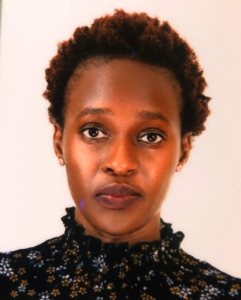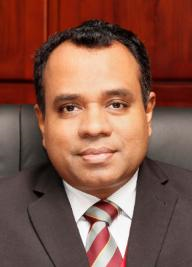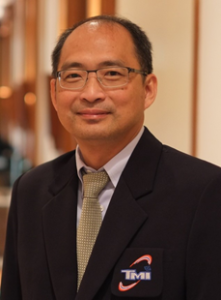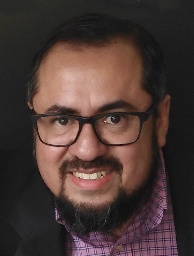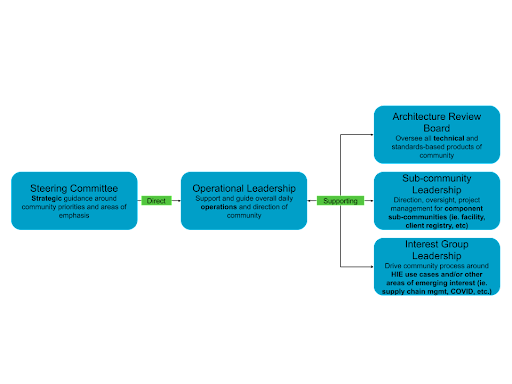Membership in the Steering Committee is primarily based on regional representation providing an opportunity for multiple countries to standardize support given. The OpenHIE Steering Committee’s mission is to provide fundamental guidance around community priorities and areas of emphasis to OpenHIE’s Operational Leadership Team which supports and guides overall daily operations and direction for the community driven on real world experiences. This “strategic” leadership will help to inform strategies, roadmaps, and future plans for the OpenHIE community.
Open Seats: Currently, the OpenHIE Steering Committee has two open seats for representation in the Americas.
Inaugural Members
East Africa
Andrew Likaka, MBBS, MPH | |
|---|---|
Dr. Andrew Likaka isa medical doctor with postgraduate studies in Public Health, serving as the Director of the Quality Management and Digital Health Directorate in the Ministry of Health and Population in Malawi. He is responsible for providing strategic leadership and coordination of quality of care and digitalization in the health sector. He has led the process of establishing the Quality Management Directorate in the Ministry of Health in Malawi. Dr. Likaka is an Improvement Advisor (IHI) and a Global Health Specialist (University of Melbourne, Australia). He has expertise in health program design, implementation, and evaluation. He has been appointed to head the Digital Health Division in the Ministry of Health and Population, with an aim of championing the digitalization of the health sector as part of the government sectoral-wide reforms for efficiency. He has worked in various capacities from a Medical Officer, Senior Medical Officer, Chief Medical Officer, District Medical Officer, and District Health Officer in different Districts in Malawi. Dr. Likaka has facilitated development of various health policies and strategies. He is a National Coordinator of the Malawi Health Situation Room which is advancing data usage for strategic decision making through virtualization at all levels. Dr. Likaka is the Chair of the National Quality Commission for Health Systems in Malawi and has spent most of his career setting up new systems and developing policies to improve quality of health services in Malawi and SADC Region. He is a keynote speaker in many international quality conferences and leads the Global Network for Improving Quality of Care for mothers, newborns, children, adolescents, and youth, supported by WHO, UNICEF, UNFPA, USAID and the Bill and Melinda Gates Foundation. He is the Principal Investigator of KUUNIKA Data for Action Project in Malawi and a member of OpenHIE. Dr. Likaka has helped develop National Malaria Policies, Guidelines, and Protocols for Malawi and SADC. He has been part of the Global Fund Grant Writing Team for Malawi since 2007 for HIV, TB, and Malaria proposals. He has provided advisory services to various Malaria Indicator Surveys conducted in Malawi as well as being a member of the Technical Working Group for Malaria. Currently, he is leading to establish a bio-epidemiological platform in Malawi using Covid-19 as a vehicle. | |
Carol Kamasaka | |
|---|---|
Ms. Carol Kamasaka is a Ugandan national with 10 years of experience supporting the senior leadership at national and sub-national levels to access and use strategic data for decision making. She has a strong understanding of HIS and digital health having worked collaboratively with various partners. Ms. Kamasaka graduated with a Bachelor’s degree in Information Technology from Makerere University in Uganda and is currently writing her final research thesis for a Masters of Health Informatics degree from the same university. Ms. Kamasaka is a Digital Health Specialist, a role she has held for the last four years with the Division of Health Information at the Ministry of Health in Uganda. Her roles can be categorized into two: a) core IT infrastructure maintenance; and b) business intelligence, analytics and data governance. | |
West Africa
Luke Bawo, B.Pharm., MPH, PhD | |
Since 2011, Dr. Luke Bawo has served as Coordinator for Health Information Systems (HIS), Research, and Monitoring and Evaluation (M&E) at the National Ministry of Health in Liberia, providing guidance in the development and operationalization of Research, M&E and HIS systems, and leads the development of the National Health Information System & ICT Strategic Plan (2016-2021). He is presently the National Focal Person for Epi-Surveillance for the Covid-19 response in Liberia. During the West Africa Ebola Outbreak, Dr. Bawa was the National Chairman for Ebola Epi-Surveillance in Liberia and was responsible for coordinating the development and management of multiple data sources, performing real time analysis and interpretation, and providing guidance to help control and manage the Ebola outbreak. Mr. Bawo was also a Subject Matter Expert for Data Management for the joint US/Liberia clinical research initiative, Partnership for Research on Ebola Vaccine in Liberia (PREVAIL), funded by the National Institute for Health (NIH). | |
South East Asia
Vajira H. W. Dissanayake MBBS (Colombo), PhD (Nottingham), FNASSL, FIAHSI | |
Prof. Vajira H. W. Dissanayake is the Dean of the Faculty of Medicine, University of Colombo. A medical geneticist by training, he is also the Chair and Senior Professor of Anatomy, the Director of the Human Genetics Unit, and the Chair of the Specialty Board in Biomedical Informatics at the University. He was the President of the Sri Lanka Medical Association (SLMA) in 2012 and the President of the Commonwealth Medical Association (CMA) from 2016 to 2019. He is the Chairman of the Commonwealth Center for Digital Health (CWCDH), the Vice President of the International Medical Informatics Association (IMIA), and the President of the Asia Pacific Association for Medical Informatics (APAMI). He is an executive board member of the Global Genomic Medicine Collaborative (G2MC). He was elected a fellow of the National Academy of Sciences of Sri Lanka (NASSL) in 2013 and a fellow of the International Academy of Health Sciences Informatics (IAHSI) in 2020. He was conferred the Sri Lankan national titular honour of 'Vidya Jayothi' for scientific achievement in 2019. | |
Boonchai Kijsanayotin, MD, PhD, FIAHSI, FRCP(T) | |
|---|---|
Dr. Boonchai Kijsanayotin is the Chair of the Asian eHealth Information Network (AeHIN). The AeHIN promotes better use of information communication technology to achieve better health through peer-to-peer assistance and knowledge sharing and learning through a regional approach for greater country-level impacts across South and Southeast Asia. He is a member of WHO Digital Health Technical Advisory Group (DHTAG), the vice president of the Thai Medical Informatics Association (TMI), and an International Academy of Health Sciences and Informatics (IAHSI) fellow of International Medical Informatics Association (IMIA). Dr. Boonchai is an informatician and physician from Thailand. He worked in a rural public general hospital for 15 years as an internal medicine clinician before receiving a Masters and PhD in Health Informatics from University of Minnesota, USA. His working areas and research interests are national health information standards and interoperability, health information exchanges, national eHealth strategy, and health IT adoption. He is the senior research manager of the Thai Health Information Standards Development Center (THIS), Health System Research Institute (HSRI), Ministry of Public Health, and biomedical and health informatics lecturer at the Faculty of Medicine Ramathibodi Hospital, Mahidol University Thailand. | |
Latin America
Daniel Otzoy | |
|---|---|
Daniel Otzoy is a Guatemalan Computer Science Engineer with postgraduate studies in Information Technology and Health Informatics. He is a digital health technical advisor at John Snow, Inc., a public health consulting firm dedicated to improving health equity for better health outcomes, primarily developing HIS activities in Africa and Southeast Asia with projects funded by USAID. A specialist in international digital transformation with +16 years of experience, Daniel has worked in Latin America and the Caribbean on Digital Health projects financed by PAHO/WHO, Inter-American Development Bank, World Bank, CDC, Global Fund, USAID and others. These projects have involved implementing technologies in public health and healthcare sectors; promoting the adoption of digital health strategies such as EHR/EMR, telemedicine, mHealth, and Public Health Information Systems, among others; and the adoption of health information and interoperability standards. His lengthy experience also includes working on digital transformation and cybersecurity projects in the security and justice sector in Guatemala and other Latin American countries, funded by USAID and UNODC. Daniel is co-founder and Executive Director of the Central American Network for Health Informatics (RECAINSA), an expert member of both the Digital Health working group of the ITU and UNESCO Broadband Commission as well as the global Digital Public Goods working group led by UNICEF and the Digital Public Goods Alliance, and president of the digital transformation commission of the International Organization of Telehealth and Telemedicine. | |
What it Means to Serve on the Steering Committee
The OpenHIE Steering Committee’s mission is to provide fundamental guidance around community priorities and areas of emphasis to OpenHIE’s Operational Leadership Team which supports and guides overall daily operations and direction for the community driven on real world experiences. This “strategic” leadership will help to inform strategies, roadmaps, and future plans for the OpenHIE community.
Membership and Organization
- The exact number of Steering Committee members shall be specified by the committee itself and at not less than seven.
- The Steering Committee will be led by a chairperson, appointed internally. The chairperson will be supported by a co-chair (also appointed internally), who can oversee meetings when the chairperson is unavailable.
- The Steering Committee will be composed primarily of in-country leadership: at least 50% of members will be direct ministry of health or ministry-designated members.
- Other members should ideally be direct beneficiaries of the community’s proceeds to ensure the community is moving in the proper direction.
- The Steering Committee shall be a permanent consultative and adjunct part of the OpenHIE community, and works to provide direct guidance and oversight to the Operational Leadership Team.
- The Operational Leadership Team will help identify a Steering Committee leader on a rotating term to be determined.
- The Steering Committee should include individuals that represent critical areas of expertise that are relevant to the OpenHIE community and embody the following attributes:
- desire to improve health equity throughout the world
- an ability to communicate advice in a way that can tangibly be acted upon
- openness to other perspectives
- understanding of the health information system landscape within low- and middle-income countries
- Members shall initially be appointed for a two- or three-year term and can be renewed as appropriate (as needed to stagger member transitions over time). The Steering Committee can recommend the terms and appointment and reappointment process once the Committee is established. These recommendations will be approved by the Operational Leadership Team.
- The Steering Committee is supported by a light secretariat team that will arrange for meetings, manage intergroup communications, keep notes for meetings, and perform related support functions.
Understanding the OpenHIE Governance Structure
OpenHIE is a community of practice made up of different leadership groups, interest groups, committees and boards. The visual below depicts the relationship and information flow between these different groups - not a hierarchy.
Note: Some parts of the community are still under development |
The Architecture Review Board (ARB), Subcommunity Leadership, and Interest Groups/Task Forces are groups formed under the OpenHIE umbrella around particular areas of interest around health information exchange. Each group or subcommunity is open to all community members to participate in discussions. Subcommunities are facilitated by active community members who have self identified their interest to lead efforts around the strategies and goals to aid in the growth and success of the OpenHIE communities mission.
Expectations of Members
Primary expectations:
- Guide the Operational Leadership Team in the development of the strategic direction and annual operating plans for OpenHIE
- Assess quarterly community progress reports, in relation to yearly operating plan, provided by Operational Leadership Team
- Provide recommendations, feedback, guidance, and advice on current OpenHIE community activities
- Openly provide input on what the OpenHIE community could be doing to better support country realization of national architectures and implementations
- Help educate and provide external networking connections to share the goals and rationale around the OpenHIE community
- Provide innovative thinking and insights into the future of the implementation of national health data sharing architectures
What’s not expected:
- Support the OpenHIE community in an operational capacity
- Make direct financial contributions to the community
Background Info
OpenHIE became a community of practice in 2013, evolving from the work that initially began in 2009 to establish the Rwandan Health Information Exchange (RHIE). As the benefits of the information sharing approach adopted in Rwanda became apparent, interest gathered from other countries looking to apply similar enterprise architectural tactics within their environments. OpenHIE’s approaches, reference technologies, and community of practice are being leveraged or explored now within many countries.
OpenHIE is a foundation for countries, supporting interoperability by creating a reusable architectural framework that introduces a service-oriented approach, maximally leverages health information standards, enables flexible implementation by country partners, and supports interchangeability of individual components.
OpenHIE’s architecture is made up of software components, all interacting/interoperating to ensure that health information from various point-of-service systems is gathered into a health information exchange. To accomplish this, the exchange normalizes the context in which health information is created across multiple dimensions including:
- Who received health services
- Who provided the services
- Where the services were received
- What particular care and services were received
- What products may have been involved in treatment
- Who has financial responsibility
This separation of concerns supports quality, safety, and continuity of care, and facilitates the appropriate use of information needed for population health and metrics calculation.
As a community, OpenHIE has directly influenced countless national eHealth strategies including Nigeria, Kenya, Uganda, Tanzania, Ethiopia, South Africa, Rwanda, Malawi, Liberia, Sierra Leone, and many of the countries supported by the Asian eHealth Information Network (AeHIN). Many of these countries are moving past plans toward concrete implementations of health data sharing architectures. To effectively support planning and adoption OpenHIE requires dedicated secretariat support to:
- Provide overall administrative guidance
- To gather and prepare information on various health information exchange issues raised by operational leadership so committees can review information and make recommendations
- To help carry out the decisions made by Operational Leadership of OpenHIE
- To organize international Community Meetings
- To contribute in the creation and organize documentation on the OpenHIE web presence(s)
- To keep the public informed about the work of OpenHIE and its volunteer partner organizations
Today, over 450 community members are working together, with standards bodies and with technology providers to align the world towards appropriate uses of standards and to further grow and evolve the OpenHIE community. Organizations and people who participate in OpenHIE have been able to reflect the needs and vision for countries due to their working relationships but in the next phase community direction from regional leaders is needed to make sure implementations of OpenHIE’s architecture are being supported.
Document History
Release No. | Date | Author | Revision Description |
0.5 | 1/6/21 | Biondich/Thomas | Initial |
1.0 | 12/6/21 | Thomas | EOY Revisions/Updates |
1.1 | 04/22/22 | Thomas | Content updates |
1.2 | 04/26/22 | Cox | Add Member D. Otzoy |
